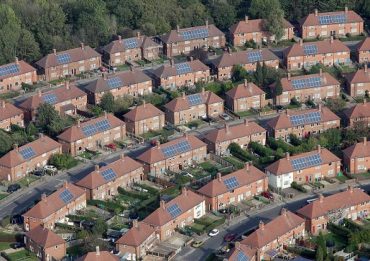Nottingham City Council looks set to invest £230m in a five-year investment programme in its housing stock, when it goes to Executive Board next week.
The Housing Revenue Account (HRA) capital programme provides funds for improvements to properties, new build council housing and improvements to estates. The HRA, which is the council’s landlord account, will also need to fund improvements to make council homes warmer and more energy efficient, both in new builds and retrofitting of the current stock. With energy prices rising sharply, creating and investing in energy efficient homes is becoming increasingly important to help lower fuel bills.
Nottingham City Council, along with its arms-length housing management company, Nottingham City Homes (NCH), has already built over 650 houses, with over 300 more new council homes planned or in the pipeline across Nottingham over the next two years, including at Bestwood and Clifton, where 144 new homes are already under construction.
The council capital programme, which aims to help improve the council’s current housing stock of 25,218 homes, includes new kitchens and bathrooms, energy efficient windows, solar panels and external wall insulation.
Additional home improvements include:
- Upgrading around 2,500 heating, 1,100 of which are high efficiency boilers
- Upgrading existing fire alarm systems across 375 homes in low rise blocks
- Delivering new, large-scale fencing, guttering, painting and concreting as part of the Decent Neighbourhoods programme, due to start shortly.
However, the HRA is facing increasing financial challenges as a result of national and local policy changes and include:
- Overall, housing stock reduction caused by Right to Buy and the need to create more new council homes to replace them
- Impact of Covid 19 on housing management costs and rental income
- Increased construction cost affecting the costs of repairs and the overall new build and investment programme
- The impact of implementing new regulations including the Building Safety Act, the Social Housing White Paper and energy efficiency requirements.
The amount of rent the council charges directly affects the money available for managing and investing in current and new council homes in Nottingham. With a continued loss of homes through Right to Buy and an increase in supply, maintenance and building costs following the Pandemic and Brexit, it means that in real terms, the council has less money available than before.
Therefore, subject to approval at Executive Board next week, the council is set to increase rents in line with the Government’s guidelines, which limits annual rent increases for social housing. This year the limit has been set at the Consumer Price Index (CPI) plus 1%, which will see an increase of 4.1%. This still means on average, council tenants in Nottingham would pay less than those in private sector homes and two thirds of council tenants receive housing support or universal credit, and therefore will receive full or partial support with their rent and service charges.
Cllr Linda Woodings, Portfolio Holder for Planning and Housing at Nottingham City Council said: “We understand that some council tenants, whose rents are not covered by housing support or universal credit, will be concerned about the increase, which is in line with the Government’s recommendations.
“However, we are still losing more homes through right to buy than we can replace with new ones and with increasing construction, maintenance and material costs following Brexit and the Pandemic, we are facing growing financial challenges. Therefore, we have to increase rents in line with the guidance in order to be able to meet all of our long-term costs. Social rents remain well below market rents.
“Not increasing the rent would have a damaging impact on the council’s ability to build new homes and make energy efficient improvements, creating warmer homes, which ultimately will help to lower or lessen the impact of increasing fuel bills.”
Nick Murphy, Chief Executive at Nottingham City Homes, said: “While we understand the increasing cost of living can be worrying, we’re here to help. Our tenancy sustainment team is here to help residents who are struggling with their bills, and can work with them to make sure they’re getting the benefits they’re entitled to.”



